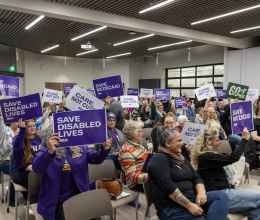
In a letter sent today to 34 Colorado municipalities that make it a crime to “loiter for the purpose of begging,” the ACLU of Colorado demanded that municipal authorities stop enforcement and take immediate steps to repeal the “legally indefensible” ordinances.
“These outdated ordinances, which prohibit peaceful, nonintrusive requests for charity in any and every public place, must be taken off the books,” said ACLU of Colorado Legal Director Mark Silverstein. “As courts across the country, and here in Colorado, have recognized, a plea for help is a communication that is protected by the First Amendment. An outstretched hand can convey human suffering, can remind passersby of the gap between rich and poor, and in some cases can highlight a lack of jobs and social services.”
Following the ACLU’s successful challenge to Grand Junction’s panhandling ordinance in federal court last year, several Colorado cities, including Denver, Colorado Springs, and Boulder, halted enforcement of laws that placed unconstitutional time and location restrictions on peaceful requests for charity.
The ordinances that prohibit “loitering for the purpose of begging” are far broader than the panhandling restrictions that were struck down in the Grand Junction decision. Instead of attempting to limit the restrictions to certain times, to certain places, or to panhandling in a certain manner, they make it a crime to ask for charity anywhere in the municipality, at any time, and by any means, including by peacefully sitting and holding a sign.
The ACLU of Colorado examined court records from ten cities that have a “loitering for the purpose of begging” law and found that eight had engaged in some form of enforcement in the last two years, either through issuing citations, warnings, or move-on orders.
“Not only do these anti-begging ordinances violate the constitutional rights of people experiencing homelessness, but they are costly to enforce and serve to exacerbate problems associated with extreme poverty. Harassing, ticketing, and/or arresting poor person for asking for help is inhumane, counterproductive, and – in many cases – illegal,” Silverstein and ACLU of Colorado Staff Attorney Rebecca T. Wallace wrote in the letter, which was delivered to all 34 cities by email this morning.
The municipalities identified as having “loitering for the purpose of begging” ordinances are Avon, Bennett, Brighton, Buena Vista, Carbondale, Cherry Hills Village, Cortez, Crested Butte, Cripple Creek, Del Norte, Dillon, Eaton, Englewood, Firestone, Garden City, Gilcrest, Green Mountain Falls, Johnstown, La Junta, Leadville, Lochbuie, Mead, Meeker, Milliken, Minturn, Nederland, Oak Creek, Platteville, Rifle, Rocky Ford, Salida, San Luis, Severance, and Timnath.
Colorado has seen a marked increase in recent years in enforcement of ordinances that effectively criminalize homelessness and poverty, including laws that make it a crime to sit, lie down, take shelter, or ask for charity in a public place. The ACLU of Colorado has committed significant resources to challenging those laws through litigation, legal advocacy, and community mobilization.
